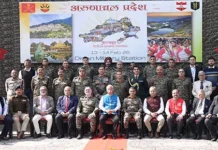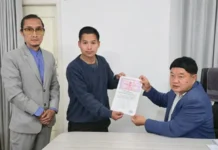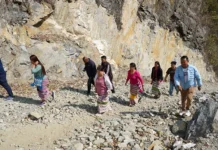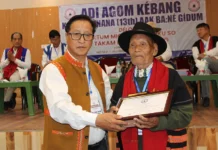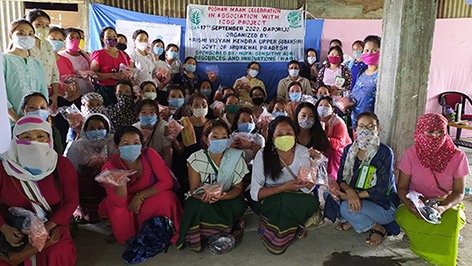
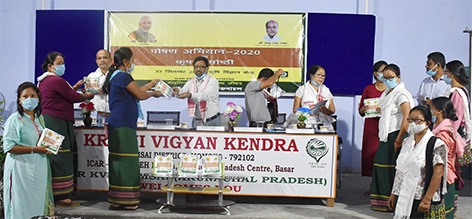
ITANAGAR, Sep 17: The Rashtriya Poshan Maah (National Nutrition Month) is being observed across the state to create awareness on the problem of malnutrition among women and children.
In Tirap district, a ‘training-cum-awareness programme’ was organized for anganwadi workers (AWW) and farmwomen by the Krishi Vigyan Kendra (KVK) on 17 September in Deomali.
Tirap KVK Head, Dr DS Chhonkar briefed about the programme, which has been launched by the government of India to combat malnutrition and make the country healthy and well-nourished.
Plant protection specialist Pura Hano made a PowerPoint presentation on the importance of nutritional gardens and bio-fortified plant varieties. He also elaborated the importance of a balanced diet, and macro- and micro-nutrients in ‘nutri-thali’ for a healthy lifestyle, especially for pregnant women.
Vegetable seeds provided through the Nutri Campaign-2020 – an initiative of the KVK and the IFFCO – were distributed to the 53 participants who attended the programme.
In Anjaw district, the KVK conducted an awareness programme in Khupa on 17 September for 20 AWWs and 59 farmers.
Horticulture scientist Rebecca Eko made a PowerPoint presentation on nutrition garden and nutritional thali, “as per the food habit of the tribal community.”
Social sciences expert S Peter Singh highlighted the aims and objectives of the programme and advised the farmers to be “aware of the existing deficiency in the nutritional status of the district.”
Agronomy scientist Khoisnam Naveen spoke about the need for bio-fortification of crops to address the “malnutrition of essential nutrients in food,” while animal science expert Dr Santosh Kumar spoke about the importance of milk in the nutrition of children and pregnant women.
Hayuliang CDPO Kara Gena Telo asked the AWWs to develop ‘nutri-gardens’ in their anganwadi centres, while DMO Dr WA Singh spoke about nutrition.
Vegetable seed packets sponsored by the IFFCO were distributed along with ‘model nutrition garden’ leaflets developed by the Anjaw KVK.
KVK Head (in-charge), Dr Santosh Kumar also spoke.
In Namsai district, the KVK observed Poshan Maah with 104 AWWs from three blocks of the district and farmwomen from Napotia, Chowkham and Momong villages.
KVK Head, Dr Debasis Sasmal emphasized on developing model nutritional gardens in anganwadi centres.
“The KVK has taken initiative and 10 anganwadi centres will have nutri-smart gardens in the coming days,” he said.
Agrometeorology expert Bidyapati Ngangom spoke on “the model of nutri-garden in an area which would include fruits and vegetables of Namsai district, along with packaging and practices of winter vegetables.”
Plant protection scientist Dr Madhumita Sonowal Bora presented a brief on the management of insects, pests and disease in fruits and vegetables.
ATMA PD B Biswas and representatives of the CDPOs of three blocks of the district attended the programme.
Vegetables seeds provided by the IIFCO and saplings of fruit-bearing trees were distributed to all the participants.
In Upper Subansiri, the Poshan Maah observation is being sponsored under the NARI and organized by the KVK in collaboration with the ICDS project in Daporijo.
Training was provided by scientists of various disciplines to 50 participants on topics like nutri-thali, nutri-kitchen garden, bio-fortified crops, nutri-sensitive innovative practices, and value chain development.
KVK Head (in-charge), Arvind Pratap urged the farmers to take up vermicomposting in their households, and presented a video on it, along with a video on farming methods in hilly regions.
ICDS Deputy Director Gobom Basar spoke on her experience of entrepreneurship in farming, and encouraged the participants to take up farming in a holistic and sustainable manner.
The participants were also provided with seeds of maize, cauliflower, sesame, beans and brinjal in the programme, along with face masks.
In Yachuli in Lower Subansiri district, 52 AWWs and farmers attended an ‘awareness-cum-training programme’ organized by the KVK to create awareness about nutritious thali and nutri-gardens.
Horticulture scientist Dr SK Chaturvedi trained the AWWs and the farmers on ways to prepare kitchen gardens. CDPO Tao Paneer and soil science specialist Dr Hage Munth also spoke.
Seeds of various vegetables were distributed to the farmers by the KVK.
In East Siang HQ Pasighat, over 90 AWWs underwent a training programme on nutrition garden, organized by the KVK in collaboration with the ICDS at the College of Horticulture & Forestry (CHF).
CHF Dean Prof BN Hazarika emphasized the need for nutri-gardens at the anganwadi centres “in order to ensure easy access to healthy diet for nutritional growth of children.” He also gave away plants to the trainees.
Prof SK Bandyopadhya presented a brief on bio-fortified varieties, while Associate Professor Dr Pranabjyoti Sharma made a presentation on the importance of non-conventional vegetables in family nutrition.
Home science expert Eloni Vida, plant protection scientist Toge Riba, and fisheries expert SM Hussain imparted training in their respective subjects.
East Siang CWC chairperson Joya Tasung Moyong and ICDS Deputy Director Machi Gao also spoke.
In Papum Pare district, 15 AWWs underwent a training programme in Karsingsa as part of Poshan Maah observation.
KVK Head, Dr Bangkeng Perme, briefed the participants on the union government’s “overarching scheme for holistic nourishment and the importance of this mission, particularly in these hours of Copid-19 pandemic.”
The KVK’s subject matter specialists Hemanta Ngangbam, Nane Taga and Tadang Meena apprised the AWWs of nutri-garden, nutri-thali and bio-fortified varieties of crops, respectively.
In Longding district, the KVK organized a programme at the community hall in Kanubari with 68 AWWs and 12 farmwomen.
KVK Head (in-charge), Dr A Kirankumar Singh discussed the importance of the Poshan Abhiyan, and imparted training in nutritional kitchen gardening.
“If children are fed a balanced diet, their physical and mental health will be good and it will result in all-round development of the society,” Dr Singh said.
He also interacted with the participants on the pros and cons of establishing nutritional kitchen gardens.
Saying that consumption of carcinogenic materials should be avoided to reduce cases of dreaded diseases such as cancer, Dr Singh stressed on following only the methods taught and applying only the recommended products, such as locally available materials of organic origin, as “chemical products used in agriculture and horticulture could be harmful for human health.”
Later, the participants were provided with 13 different vegetable seeds.

